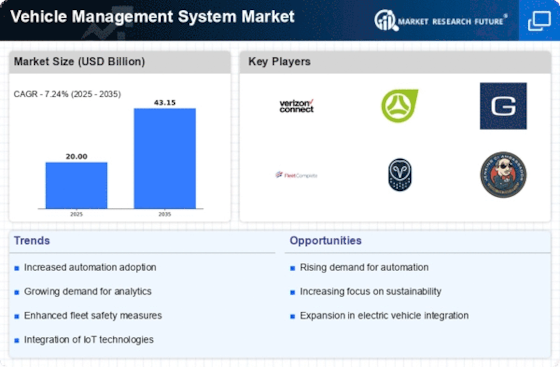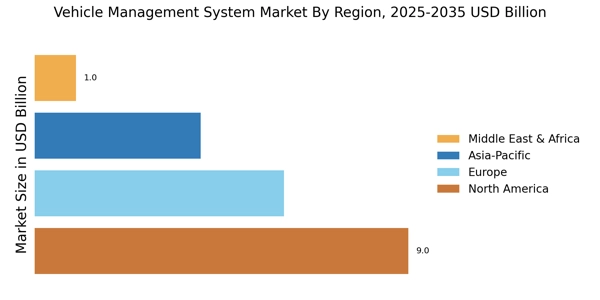Growing Environmental Concerns
Environmental concerns are increasingly influencing the Vehicle Management System Market. As awareness of climate change and pollution rises, companies are seeking solutions that minimize their carbon footprint. Vehicle management systems that promote fuel efficiency and reduce emissions are becoming essential tools for organizations aiming to adopt sustainable practices. The market for eco-friendly vehicle management solutions is projected to grow significantly, with estimates suggesting a potential increase of 15% in demand over the next few years. This shift not only aligns with corporate social responsibility goals but also meets the expectations of environmentally conscious consumers.
Rising Focus on Safety and Compliance
Safety and compliance are paramount concerns within the Vehicle Management System Market. As regulatory frameworks become more stringent, organizations are compelled to adopt systems that ensure adherence to safety standards and legal requirements. The integration of advanced safety features, such as GPS tracking and driver behavior monitoring, is becoming increasingly prevalent. This focus on safety not only mitigates risks but also enhances the overall reputation of companies. Data suggests that organizations investing in safety compliance through vehicle management systems can reduce accident rates by up to 30%, thereby underscoring the critical role these systems play in operational integrity.
Expansion of E-commerce and Delivery Services
The expansion of e-commerce and delivery services is a driving force in the Vehicle Management System Market. As online shopping continues to rise, businesses are increasingly reliant on efficient logistics and transportation solutions. Vehicle management systems play a crucial role in optimizing delivery routes, managing inventory, and ensuring timely service. The demand for these systems is expected to grow, with projections indicating a market increase of approximately 20% in the logistics sector alone. This trend highlights the necessity for companies to adopt advanced vehicle management solutions to remain competitive in a rapidly evolving marketplace.
Increasing Demand for Fleet Management Solutions
The Vehicle Management System Market is experiencing a notable surge in demand for fleet management solutions. This trend is primarily driven by the need for businesses to optimize their operations and reduce costs. Companies are increasingly adopting vehicle management systems to enhance efficiency, monitor vehicle performance, and ensure compliance with regulations. According to recent data, the fleet management segment is projected to grow at a compound annual growth rate of approximately 10% over the next five years. This growth is indicative of the industry's shift towards more sophisticated management tools that provide real-time insights and analytics, thereby improving decision-making processes.
Technological Advancements in Vehicle Management
Technological advancements are significantly shaping the Vehicle Management System Market. Innovations such as artificial intelligence, machine learning, and the Internet of Things are being integrated into vehicle management systems, enhancing their capabilities. These technologies enable predictive maintenance, real-time tracking, and data analytics, which are essential for optimizing fleet operations. The market for these advanced systems is expected to expand, with estimates indicating a growth rate of around 12% annually. This trend reflects a broader movement towards automation and data-driven decision-making in vehicle management, positioning companies to leverage technology for competitive advantage.

















